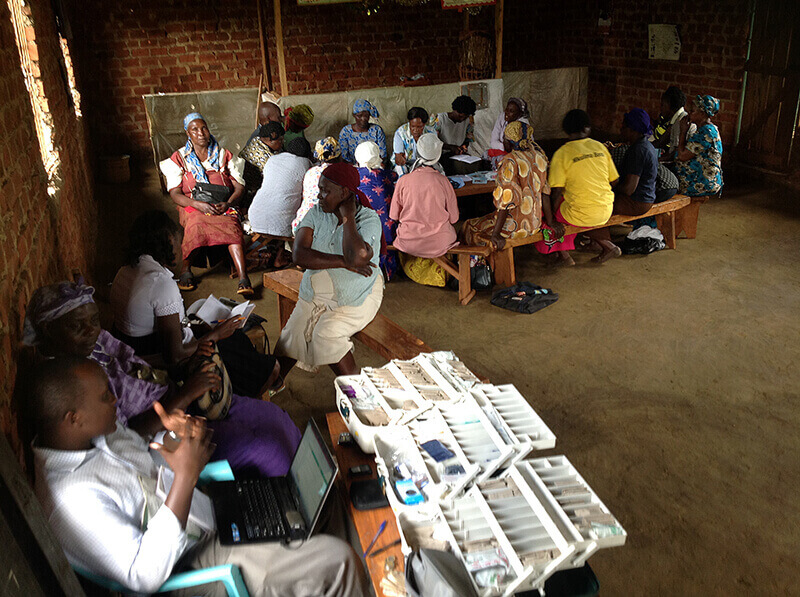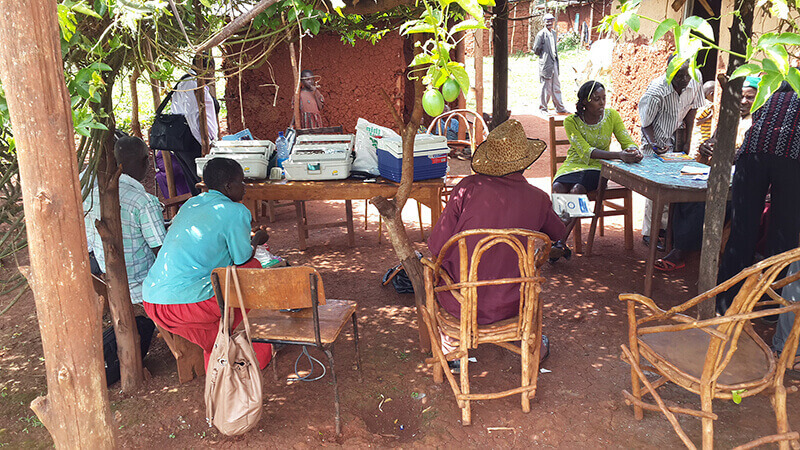April 11, 2019
A dollar a day could help keep the doctor away … or bring them closer
 Purdue University researchers have developed a model to help meet the medical and financial needs of families in the rural parts of Kenya. (Image provided)
Download image
Purdue University researchers have developed a model to help meet the medical and financial needs of families in the rural parts of Kenya. (Image provided)
Download image
Health care program combines health and finance for rural areas
WEST LAFAYETTE, Ind. – Cardiovascular disease, including heart attacks and strokes, is the leading cause of disease-related death in the world. Eighty percent of cardiovascular deaths occur in low- and middle-income countries.
In countries such as Kenya and other parts of sub-Saharan Africa, financial and mobility constraints often limit rural patients’ access to the much-needed health care services these populations need to thrive. In response to this, Purdue University researchers have developed a model to help meet the medical and financial needs of families in the rural parts of Kenya.
“We have designed a model that leverages the unique strengths of Purdue and provides, for the first time, a responsive program to meet the health care and economic needs in rural Kenya,” said Sonak Pastakia, an associate professor in Purdue’s College of Pharmacy.
Bridging Income Generation through grouP Integrated Care – or BIGPIC – is a health care program that brings together medicine and economic opportunities through microfinance and job opportunities.
Instead of requiring members of rural communities to travel long distances to reach health care facilities, BIGPIC lets community members work with community health workers who help them form self-help microfinance groups. Those groups provide micro-loans and create agricultural cooperatives that increase the returns on investment.
 Bridging Income Generation through grouP Integrated Care – or BIGPIC – is a health care program that brings together medicine and economic opportunities through microfinance and job opportunities. (Image provided)
Download image
Bridging Income Generation through grouP Integrated Care – or BIGPIC – is a health care program that brings together medicine and economic opportunities through microfinance and job opportunities. (Image provided)
Download image
These community-based group meetings also serve as a makeshift clinic as a team of doctors, nurses and pharmacists visit these groups and bring state-of-the-art, point-of-care labs and a full complement of medications to address the wide spectrum of health care needs this population has.
From remotely addressing cervical cancer through initial seed funding from the Edmundsen Family Foundation to incorporating discounts to improve returns on livestock rearing, the BIGPIC activity is contextualized to address the unique needs of this population. These activities are done in a sustainable fashion, as all patients are required to pay subsidized user fees or use their insurance coverage to cover the costs.
Pastakia said published results of the BIGPIC pilot study showed an average drop in systolic blood pressure of 22 mmHg among participants. The average group member received a 47% return on their investment in microfinance.
“I am delighted to receive such good care close to home and avoid expensive travel,” said Naomi, a patient in Kenya who asked that her last name not be used.
Pastakia called the study promising.
“This is a unique model of health care that harnesses the strength of community and addresses the fact that money is the primary sustainable motivating force in the provision of health care,” Pastakia said. “Patients are financially motivated to maintain monthly attendance at the microfinance groups, where they receive care from mobile providers.”
The next step for the Purdue program is partnering with the Kenyan government’s national insurance program to include BIGPIC as an option for families.
Pastakia and his team in Africa have worked with the Purdue Office of Technology Commercialization to patent some of their technologies. His research team is looking for additional researchers and investors to provide the initial seed capital to scale up this sustainable method of health care delivery.
Pastakia attended the Entrepreneurial Learning Academy at the Burton D. Morgan Center for Entrepreneurship. The center also houses the Purdue Foundry, part of the Purdue Research Foundation, which helps startups based on Purdue innovations.
Their work aligns with Purdue's Giant Leaps celebration, celebrating the global advancements in health as part of Purdue’s 150th anniversary. Health is one of the four themes of the yearlong celebration’s Ideas Festival, designed to showcase Purdue as an intellectual center solving real-world issues.
About Purdue Office of Technology Commercialization
The Purdue Office of Technology Commercialization operates one of the most comprehensive technology transfer programs among leading research universities in the U.S. Services provided by this office support the economic development initiatives of Purdue University and benefit the university's academic activities. The office is managed by the Purdue Research Foundation, which received the 2016 Innovation and Economic Prosperity Universities Award for Innovation from the Association of Public and Land-grant Universities. For more information about funding and investment opportunities in startups based on a Purdue innovation, contact the Purdue Foundry at foundry@prf.org. For more information on licensing a Purdue innovation, contact the Office of Technology Commercialization at otcip@prf.org. The Purdue Research Foundation is a private, nonprofit foundation created to advance the mission of Purdue University.
Writer: Chris Adam, 765-588-3341, cladam@prf.org
Source: Sonak Pastakia, spastaki@gmail.com

